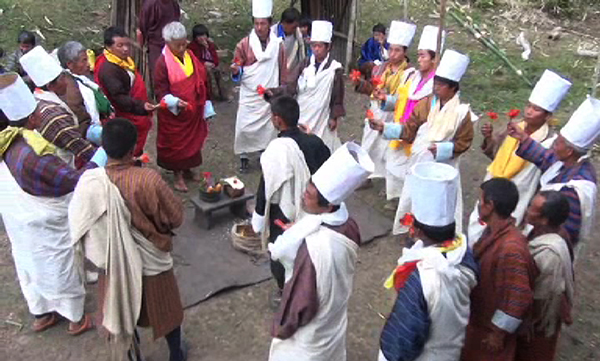 Many local villages and communities have their own age-old tradition of making offerings to their local deities. It is to bring peace and harmony and also to ward-off evil spirits. One such tradition called Dueza is still being practised in Chhimoong Gewog under Pema Gatshel.
Many local villages and communities have their own age-old tradition of making offerings to their local deities. It is to bring peace and harmony and also to ward-off evil spirits. One such tradition called Dueza is still being practised in Chhimoong Gewog under Pema Gatshel.
It is early in the morning. Men draped in white robes and white hats, representing fishermen of the community, chant prayers and proceed in queue to a nearby chorten. It signifies escorting their local deity to appease him.
Some of the village elders say there was a time when their community had nothing to eat. It was during that time when their local deity came to them and solved all their miseries and misfortunes.
“The legend has it that our community was an impoverished one, and in order to find ways to get rid of their misfortune they hired a Gomchen called Fawang, from a place called Aa-su-raya, the present day India. Taking a basket full of sugarcanes, it is said that he appeased the local deity,” said Pema Gyeltshen, an elderly local resident.
|
|
|---|
The offering is also a time for the community to get together, eat and enjoy. However, the village elders are worried that their tradition is slowly dying as the younger generations are not so keen to take part in the offerings.
“We are worried that our tradition will be lost someday. The younger generations, after completing their studies, never return and even if they do, they are not so interested to part,” said Jigme Tenzin, a local resident.
Some are worried that if they stop making such offerings some misfortunes might befall on them and their children. “I do not know how our children will live up to it, but I am really worried,” said another resident, Pema Ngadon.
“I remember clearly that during our parents’ time it used to be grand one. Almost all the people in community will come together to make it happen,” said Bumchu Wangdi.
The issue was even discussed during their gewog meetings. “During our meetings we decided that there should be one representative from each household. Even the workload and responsibilities will be divided equally among the representatives. We have signed the agreement as well,” said the Mangmi of the gewog, Yeshi Wangdi.
The Dueza is observed for 15 days, from the 1st day of the 2nd Bhutanese month until the 15th day. And the offerings are made for three days, from 10th day till the 12th day.












